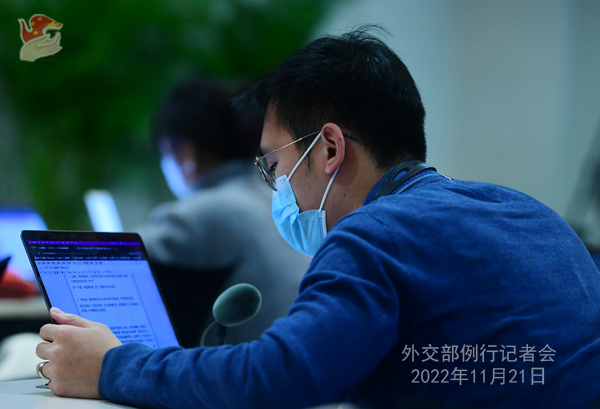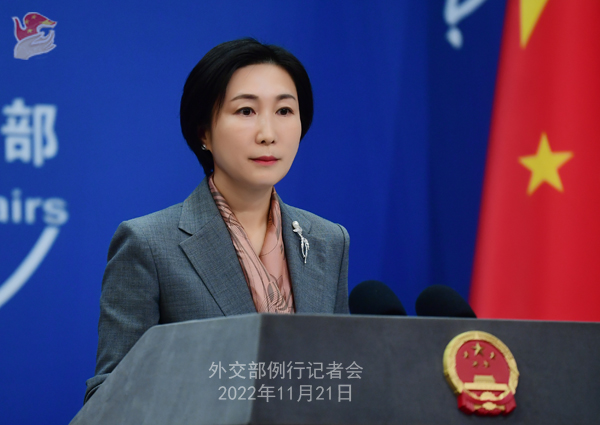
The Paper: The Chinese side has announced that First Secretary of the Central Committee of the Communist Party of Cuba and Cuban President Díaz-Canel will soon visit China. Could you share with us the program and China’s expectations for this visit? How does China view the current China-Cuba relations?
Mao Ning: Cuba was the first country in the Western hemisphere and Latin America and the Caribbean to establish diplomatic relations with the People’s Republic of China. China and Cuba are each other’s good friends, good comrades and good brothers who trust each other and share weal and woe. Since the establishment of diplomatic ties 62 years ago, despite international vicissitudes, China and Cuba have forged ahead together on the path of building socialism with national characteristics, supported each other on issues concerning core interests and had close coordination on international and regional issues, setting an exemplary model for solidarity and cooperation between socialist countries and sincere mutual assistance between developing countries.
President Díaz-Canel will be the first head of state from a country in Latin America and the Caribbean that China receives after it held the 20th National Congress of the Communist Party of China. We are confident that President Díaz-Canel’s visit will inject new impetus into the development of China-Cuba relations and boost new progress in our traditional friendship and friendly cooperation.
CCTV: President Xi Jinping returned to China last weekend after attending the 17th G20 Summit and the 29th APEC Economic Leaders’ Meeting and visiting Thailand. What’s China’s comment on the outcomes and the significance of the trip?
Mao Ning: President Xi’s visit is a productive and vitally important event of head-of-state diplomacy after the successful 20th National Congress of the Communist Party of China (CPC). Over six days and five nights, President Xi attended more than 30 events with rich substance and a far-reaching impact.
First, the trip increased the world’s understanding of China. On bilateral and multilateral occasions, President Xi shared with world leaders the stories of the 20th CPC National Congress, Chinese modernization and China’s cooperation with the global community for win-win results with systematic clarity, depth and insightfulness. The stories presented the bright prospects of China’s high-quality development and high-standard opening-up and sent out a strong message of China’s abiding commitment to world peace and development and to greater opening-up and cooperation. President Xi spoke from a global perspective and was clear and effective in his communication. The world readily understood what he said and found it convincing and highly relevant. This has helped other countries better understand and be more receptive of the CPC’s governing strategy and China’s path and vision. All sides extended warm congratulations on the success of the CPC National Congress and President Xi’s reelection as the General Secretary of the CPC Central Committee. They commended China’s historic achievements made under the leadership of President Xi, and expressed confidence that China will continue to enjoy stability and prosperity and make greater contributions to the whole world.
Second, the trip presented China’s solution to the world. President Xi called for global efforts to advance a community with a shared future for humanity and make global development more inclusive, more resilient and beneficial to all. President Xi also stressed the need to build a global partnership for economic recovery, reiterated the International Cooperation Initiative on Global Food Security and expressed China’s support for the African Union in joining the G20. These proposals have been warmly received among fellow developing countries. Drawing on the experience gained from the success of Asia-Pacific economic cooperation, President Xi noted that the Asia-Pacific is no one’s backyard and should not become an arena for big power contest. He also put forward a six-point approach to advancing Asia-Pacific cooperation under the new circumstances, underlining the importance to follow a path of peaceful development, openness and inclusiveness, and solidarity. In the face of complex and challenging international dynamics, China has once again made a strong call of the times for solidarity and cooperation, put forward solutions for global governance with strategic insights and played a constructive role in the success of the G20 Summit and the APEC meeting.
Third, the trip further deepened China’s ties with the world. During the trip, China and Indonesia reached the important consensus on building a China-Indonesia community with a shared future. China and Thailand announced that they will build a China-Thailand community with a shared future for enhanced stability, prosperity and sustainability. President Xi had intensive bilateral engagement with world leaders, through which China cemented mutual trust and friendship with its neighbors in Asia, encouraged major countries in Europe to uphold strategic autonomy and explored the right way for China and the US to get along with each other in the new era. The leaders all expressed a strong desire to deepen cooperation with China and reiterated their firm commitment to the one-China policy. More and more countries have come to see that China’s development adds to the force for peace and progress and that China is a friend and partner they can trust and need to have.
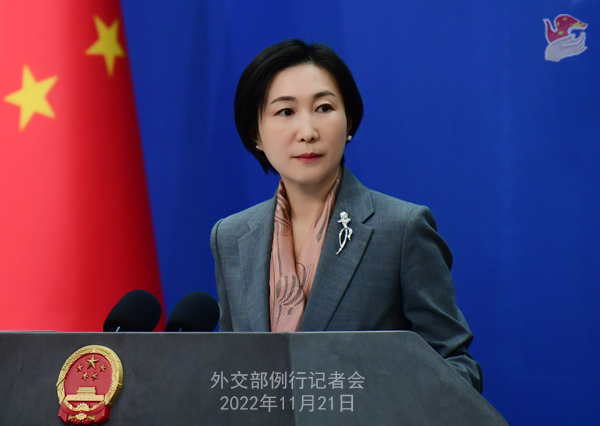
China Daily: According to reports, Kazakhstan held snap elections on November 20 and President Kassym-Jomart Tokayev was reelected. What’s China’s comment?
Mao Ning: China congratulates President Tokayev on his reelection. President Xi has sent him a congratulatory message.
China and Kazakhstan are friendly neighbors and permanent comprehensive strategic partners. In September this year, President Xi Jinping paid a successful state visit to Kazakhstan. The two heads of state agreed to build a community with a shared future defined by lasting friendship, a high degree of mutual trust and sharing weal and woe, pointing out the way forward for the development of bilateral relations. China is ready to work with Kazakhstan to elevate China-Kazakhstan relations to a new height and deliver even more benefits to the two countries and two peoples.
Xinhua News Agency: According to reports, on November 18, the IAEA said in a press release that from November 14 to 18, the IAEA Task Force visited Japan, made a field trip to the Fukushima Daiichi Nuclear Power Station, and reviewed the updated technical plans for the water discharge by Tokyo Electric Power Company (TEPCO) and the equipment and facilities to be used for the discharge. A report of this week’s mission will be made available within three months. The release also noted that the IAEA will publish a comprehensive assessment on the safety of the discharge prior to the planned release in 2023. What is China’s comment?
Mao Ning: I have noted relevant reports. The Chinese side supports the IAEA and its Task Force in reviewing and assessing the disposal of nuclear-contaminated water from Fukushima. We hope the Task Force will carry out its task in an objective, just and science-based way and strictly implement the IAEA nuclear safety standards in order to ensure absolute safety of the disposal of nuclear-contaminated water. The final safety assessment of the Task Force must be based on the experts’ mission findings and review and the actual needs of the task. To ensure the report’s quality and credibility, setting up a deadline for the publication is inadvisable. The Japanese side should cooperate closely with the Task Force.
It needs to be pointed out that the Task Force has not evaluated the alternatives to ocean discharge, leaving the IAEA unable to conduct a comprehensive evaluation and find the best way to dispose of nuclear-contaminated water. China supports the work of the Task Force, but this does not mean we agree with Japan’s wrong decision of discharging nuclear-contaminated water into the sea.
China hopes that the Japanese side will seriously respond to parties’ concerns and act responsibly to find a proper way to dispose of nuclear-contaminated water, instead of pushing through the plan to discharge the water into the ocean. Until then, Japan should not go ahead with the discharge of nuclear-contaminated water into the sea.
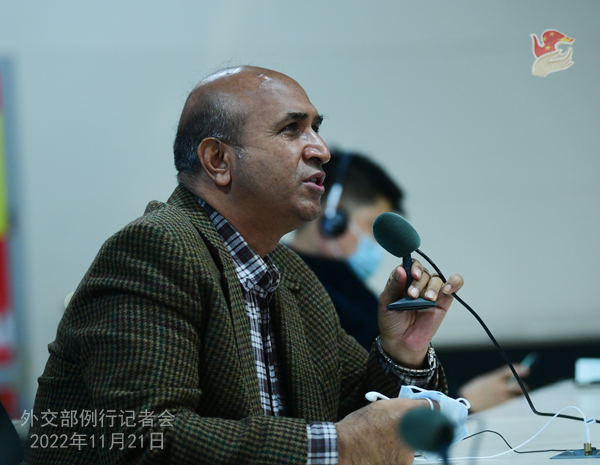
Associated Press of Pakistan: During Prime Minister Shehbaz Sharif’s visit to Beijing earlier this month, Pakistan and China agreed to work on high-quality development of CPEC and four new corridors (Digital, Industrial, Green and Health). Would you like to share some details here?
Mao Ning: The China-Pakistan Economic Corridor (CPEC) is a flagship project of China-Pakistan cooperation and has made tangible contributions to Pakistan’s socioeconomic development and the region’s connectivity. In recent years, both sides have continued to expand the cooperation areas under CPEC and notable progress has been made in digital, industrial, green and health cooperation. For example, China and Pakistan have set up a joint working group on information technology and held its first meeting. China has donated solar panels to the province of Balochistan. Apart from initial results in the greening project in the Gwadar Port, China and Pakistan have also carried out effective cooperation against COVID-19. China stands ready to work with Pakistan to follow through on the important consensus of the two leaders, accelerate relevant practical cooperation and make CPEC a demonstration project for high-quality Belt and Road cooperation.
Shenzhen TV: As we understand, the 14th round of high-level consultations on maritime affairs between China and Japan will be held soon. Can you share with us the date, location and agenda of the event?
Mao Ning: As agreed by the two sides, China and Japan will hold the 14th round of high-level consultations on maritime affairs virtually on November 22. Officials on both sides from departments responsible for foreign affairs, defense, maritime law enforcement, marine management and so on will attend the event.
The high-level consultations are conducted as a comprehensive mechanism of communication and coordination for maritime affairs between China and Japan. We look forward to a thorough exchange of views on maritime issues of mutual interest with the Japanese side to increase our mutual understanding and trust and advance practical cooperation in the maritime fields.
Prasar Bharati: Media reports have said that Kenya’s transport minister has called for an extension of the repayment period of $5 billion debt taken under China’s Belt and Road program for Kenya’s railway project. Will China accede to this request by the Kenyan government?
Mao Ning: I want to stress that China has provided financing support for African countries including Kenya, which has helped countries concerned in their development. We will continue to promote development cooperation with African countries.
Bloomberg: US Vice President Kamala Harris is in the Philippines to discuss, among other items, the building of nuclear power plants with American technology. On Tuesday, she’ll visit Palawan, which is on the edge of the South China Sea. Does the Chinese foreign ministry have any comment about Vice President Harris’s Philippine visit, in particular, the Palawan leg of that trip?
Mao Ning: We are not against the US’s interaction with regional countries. But it should be good for regional peace and stability and not damaging to other countries’ interests.
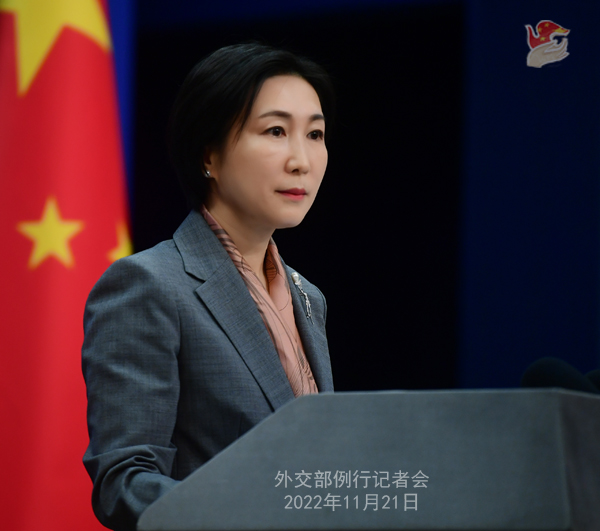
AFP: Another question on Malaysian elections. There is no clear winner after the Malaysian elections. Major parties were unable to secure enough votes to form a new government. Is China following the situation and is China concerned about the situation?
Mao Ning: The elections and the formation of the government are Malaysia’s internal affairs. I will not comment on them.
What I can tell you is that China and Malaysia are traditional friendly neighbors. China greatly values its friendly ties with Malaysia. Our relations have always maintained sound momentum of growth. China hopes and believes that Malaysia will continue to enjoy stability and prosperity. We will work with Malaysia to continue to advance the China-Malaysia comprehensive strategic partnership for the benefit of the two peoples and regional peace and stability.
AFP: As COP27 closed in Sharm el Sheikh, Egypt last weekend, how does China assess the outcomes of the conference?
Mao Ning: On November 20, COP27 in Sharm el Sheikh was concluded after being extended for over a day. The conference was held as the UNFCCC marks its 30th anniversary this year. The conference focused on implementing the Paris Agreement and reached a relatively balanced package of outcomes. The conference unleashed a positive signal of upholding multilateralism and jointly enhancing the response to the climate challenge.
The outcomes of COP27 demonstrated the principle of common but differentiated responsibilities and other institutional principles of the UNFCCC and the Paris Agreement and laid out the steps to be taken on mitigation, adaptation and other key issues on the agenda of the compliance with the Paris Agreement, which is conducive to the full and effective implementation of the Agreement. The conference also created a framework arrangement for the funding on loss and damage and set up a loss and damage fund to effectively address the urgent need of developing countries.
In the meantime, developed countries have yet to deliver on their promise of mobilizing $100 billion per year for climate action in developing countries and to offer a roadmap for doubling adaptation finance. This is not a good way to build mutual trust between the North and the South. Global climate governance remains an uphill task.
China attached great importance to this meeting, and fully supported Egypt in making it a full success. China’s Special Envoy on Climate Change Xie Zhenhua attended the conference as the special representative of President Xi Jinping. The Chinese delegation fully engaged in the consultations over nearly a hundred agenda items and closely coordinated with the UNFCCC Secretariat, Egypt as COP27 host and all other parties. We firmly defended the common interests of developing countries, and made important contribution to the package of positive outcomes the conference achieved.
China will continue to actively participate in global climate governance, promote a fair and equitable system of global environmental governance for win-win cooperation, and build a community of life for humanity and nature.
